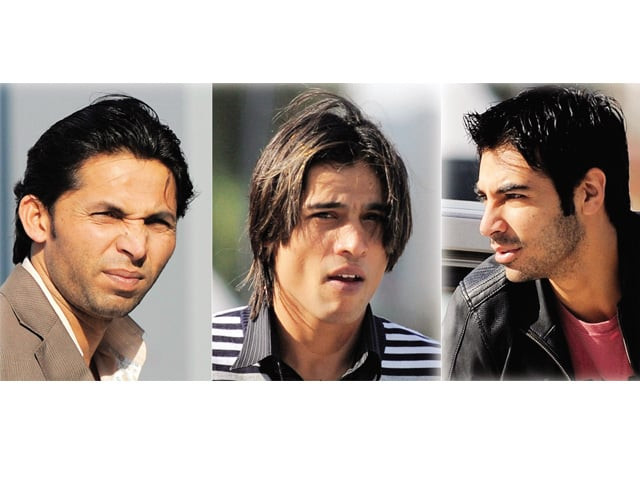Spot-fixing controversy: Ominous signs on eve of judgment day
A day before Asif, Amir, Butt hear their cricketing fate, a UK court indicts trio, summons them to appear on March 17.

The build up to the day the ‘tainted trio’ are to learn the fate of their cricketing careers – each more promising than the next – could not have been more deflating for one, if not all three players and the nation’s cricket fans.
Friday, the day before Salman Butt, Mohammad Asif and Mohammad Amir, will hear the verdict of a three-member independent tribunal regarding match-fixing allegations, saw the three formally indicted by a British court on charges of “conspiracy to obtain and accept corrupt payments” as well as “cheat.”
The only consolation is that the court has also charged UK-based ‘agent’ Mazhar Majeed, who has been disconcertingly absent from the discourse surrounding what could be cricket’s biggest debacle, has also been included in the charges.
Butt, the former Test captain, and pace bowlers Asif and Amir have been accused of conspiring in the bowling of deliberate no-balls while Majeed is accused of accepting £150,000 to fix the actions of players on last year’s tour of England.
“The Crown Prosecution Service (CPS) has authorised charges of conspiracy to obtain and accept corrupt payments and also conspiracy to cheat against Mohammad Amir, Mohammad Asif, Salman Butt and Mazhar Majeed,” said Simon Clements, head of the CPS Special Crime Division.
Majeed will appear before City of Westminster Magistrates’ court on March 17 while summons for the three players have been issued for the same date. The CPS further confirmed that extradition will be sought if the three players fail to appear in court.
On their part, the three players, along with their lawyers, are currently in Doha to hear the fate of their cricketing careers in a separate hearing before an independent tribunal, in which the International Cricket Council (ICC) had charged the players with various offences under the ICC Anti-Corruption Code for Players and Player Support Personnel.
Pakistan’s tour of England last summer was steamrolled by sting operation conducted by Britain’s tabloid newspaper News of the World claiming to have uncovered a “match-fixing” racket.
The charge later became that of “spot-fixing” - where money can be gambled on specific incidents in a match without the need to ‘fix’ the match result.
The operation claimed to have caught the involvement of the tainted trio – that too on tape.
Subsequently, the three players were interviewed by Scotland Yard along with Majeed, whom the newspaper alleged accepted £150,000 to set up the deal. Majeed was arrested, and a third fast bowler, Wahab Riaz, was also interviewed.
The ICC, after suspending the trio, constituted a three-man tribunal to determine charges brought under the ICC Anti-Corruption Code in relation to two Test matches played in August 2010 between Pakistan and England – the Oval Test and the Lord’s Test.
During a six-day hearing, the ICC tribunal had withdrawn all charges against the three players in relation to the Oval Test except for one against Butt.
The CPS, however, has decided that the players also have a case to answer under English law in addition to the ICC hearings.
“The Crown Prosecution Service has been working closely with the Metropolitan Police Service since the allegations of match-fixing became public on 29 August, 2010,” added Clements. “We received a full file of evidence on 7 December, 2010, and we are satisfied there is sufficient evidence for a realistic prospect of conviction and it is in the public interest to prosecute.”
British law states that obtaining and accepting corrupt payments is an offence contrary to section 1 of the Prevention of Corruption Act 1906 that can result in a seven-year sentence and unlimited fine. The maximum sentence for cheating is two years.
Published in The Express Tribune, February 5th, 2011.



















COMMENTS
Comments are moderated and generally will be posted if they are on-topic and not abusive.
For more information, please see our Comments FAQ